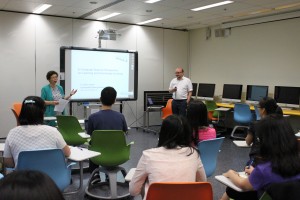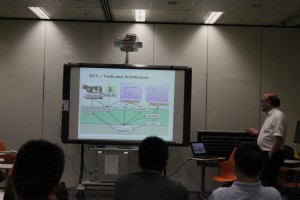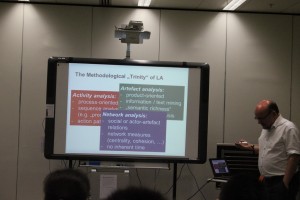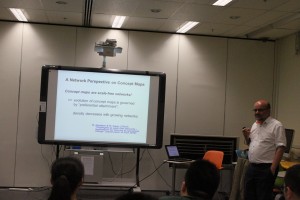Tag Archives: learner-created models
A computer science perspective on collaborative learning and knowledge building
Speaker: Professor H. Ulrich Hoppe, the University of Duisburg-Essen, Germany
Date: June 20, 2014
Time: 12:45-14:00
Venue: Runme Shaw 101, HKU
Abstract
The Collide research group (”Collaborative Learning in Intelligent Distributed Environments”, link: http://www.collide.info) at the University of Duisburg-Essen (Germany) forms part of the Department of Computer Science and Applied Cognitive Science within the Faculty of Engineering. First, the talk will briefly address the interdisciplinary composition of the department and its impact on teaching and advanced student projects. Then it will focus on two example project areas.
(A) Technical support for collaborative inquiry learning:
The EU project COLDEX (“Collaborative Learning and Distributed Experimentation”, 2002-05), led by the Collide group, developed and tested collaborative modelling tools for various areas of science learning together with a globally accessible repository of learner-created models. Learning by sharing such “emerging learning objects” was a main theme of COLDEX. This idea has been taken up in a later EU project (SCY – “Science Created by You”, 2008-12), coordinated by the Univ. of Twente (NL), by facilitating learner experience through larger “missions” in the SCY-Lab environment. The on-going EU project Go-Lab (2012-16) focuses on providing uniform access to a variety of remote laboratories, both virtual and physical. It particularly features customisable web-based learning environments and learning analytics components.
(B) Applying network analysis techniques to learning and knowledge building communities:
In the context of the European “Science in Society” project SISOB (2011-13), Collide has developed a flexible workbench for network analysis of knowledge building communities. Whereas SISOB studied the social impact of science and research in general, these tools have also been applied in a “Learning Analytics” context, e.g. to analyse the evolution of ideas in the Wikiversity community. A recent application addresses patterns of resource usage in a blended learning course.
About the speaker
H. Ulrich Hoppe holds a full professorship for “Cooperative and Learning Support Systems” in the Department of Computer Science and Applied Cognitive Science (Engineering Faculty) at the University of Duisburg-Essen, Germany. With an original background in mathematics and physics, followed by a PhD in educational technology (Tuebingen University, 1984), Ulrich Hoppe has been working for more than ten years in the area of Intelligent User Interfaces and Cognitive User Models (1984-95), before he re-focused his research on Technology-Enhanced Learning and Knowledge Management. He joined the University of Duisburg as a professor in 1995 and founded the research group COLLIDE on Collaborative Learning in Intelligent Distributed Environments (COLLIDE) in the same year.
With the COLLIDE group, Ulrich Hoppe has been engaged in more than 10 European projects in the area of advanced computational technologies for learning and and knowledge management. Ulrich Hoppe has been programme co-chair of CSCL 2003 in Bergen (Norway), AIED 2003 in Sydney (Australia), ICCE 2007 in Hiroshima (Japan), and CRIWG 2012 in Raesfeld (Germany).
His current research interests are:
* Interactive and collaborative media for learning and knowledge construction
* Analysis, modelling, and intelligent support of interactive and collaborative learning processes
* Social network analysis and community support.







